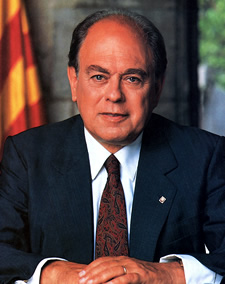Jordi Pujol
(politician) | |
|---|---|
 | |
| Born | 1930-06-09 Barcelona, Catalonia, Spain |
| Nationality | Spanish |
| Alma mater | University of Barcelona |
| Children | children |
| Spouse | Marta Ferrusola |
| Party | Convergència Democràtica de Catalunya |
Jordi Pujol i Soley is a Catalan (Spanish) politician who was the leader of the party Convergència Democràtica de Catalunya (CDC) from 1974 to 2003, and President of the Generalitat de Catalunya from 1980 to 2003.
Contents
Early Life
Pujol was born in Barcelona, studied at the German School of Barcelona and received a medical degree from the University of Barcelona. During his college years, he joined different activist groups that were seeking to rebuild the ideal Catalonia that the Spanish Civil War and Franco's dictatorship had undermined.
As a physician, Pujol was inventor of the antibiotic ointment Neobacitrin while working in the family-run laboratory Fides Cuatrecasas.[1] The ointment went on to achieve great success and is still used today.
Political career and President of Catalonia
In 1974, Pujol founded the political party called Convergència Democràtica de Catalunya (CDC) (Democratic Convergence of Catalonia in English), of which he was the first Secretary. The political party was not legalized until 1977, during the Spanish transition to democracy after Franco's death in November 1975. From 1977 to 1980, Pujol was Minister without portfolio in the Provisional government of Catalonia, presided by Josep Tarradellas. In 1977 he led Pacte Democràtic per Catalunya, a coalition of Catalan parties that were trying to approve the Statute of Autonomy of Catalonia. In the Spanish general election of 1977 he was elected to the Spanish Congress of Deputies, representing Barcelona. Pujol was re-elected at the 1979 General Election but resigned from the parliament in 1980.
On 20 March 1980, the first Parliament of Catalonia elections after Franco's regime were held. The Catalan nationalist party Convergència i Unió (coalition of CDC and Democratic Union of Catalonia) won the elections and Pujol was elected President of the Generalitat de Catalunya on 24 April 1980. He was reelected again in 1984, 1988, 1992, 1995 and 1999.
Pujol is a supporter of European integration. In 1985, he started a collaboration with Edgar Faure in the Council of the Regions of Europe (CRE), which would later become the Assembly of European Regions (AER). Pujol was the President of the Assembly of European Regions from 1992 to 1996.[2] Pujol retired in 2003. He left the head of the party (CDC) to Artur Mas.
Pujol and Catalan nationalism
During the last decades of the Franco regime and his 23 years as President of the Generalitat de Catalunya, Pujol leant towards the majority tendency in Catalan nationalism, which, instead of seeking a fully independent republic, intended to work towards a federalized Spain that would, according to Pujol, recognize Catalonia "as a country, as a collective with its own personality and differences," and a "guarantee that her own identity be respected".[3] With the conservative People's Party opposing the Catalan Statute of Autonomy, however, as well as the recognition for the language in the east of Aragon, Pujol has stated that, at least shortly before the Spanish transition to democracy, "there is more aggression towards Catalonia than ever", and that Catalans can "no longer hope for anything from the Spanish state".[4]
A lifelong federalist, Pujol has recently become very disenfranchised by the Spanish political arena. He also has recently stated, regarding the recent surge of Catalan separatism that more people than ever want independence, "and they have the right to want it."[5]
Corruption scandals
Template:Update In July 2014, Jordi Pujol released a note explaining that for 34 years, including 23 as the President of Catalonia, he had maintained secret foreign bank accounts inherited from his father. The note apologized for his actions and explained that the millions had been declared and taxes paid. The scandal erupted in the Spanish media as it involves allegations against many family members, including trafficking of influence, bribery, money laundering and public corruption. At this time, his sons Jordi and Oleguer Pujol Ferrusola are being investigated by tax authorities. Another son Oriol Pujol resigned from his leadership position in CiU earlier in the month to face charges of public corruption as well. As a direct result of Pujol's admission on 29 July, Judge Pablo Ruz issued an indictment against Jordi Pujol Ferrusola and his wife for money laundering and tax evasion.[6]
Pujol and his family have been suspected for many years of cashing in on the political power he amassed as a 23-year president of Catalonia. In 1984 his family's bank went bankrupt and was taken over by the Spanish government. His children have amassed a fortune in private businesses that frequently did business and received contracts from the Catalan government. Pujol's wife and children have investments in the tens of millions of dollars in Mexico, Panama and Argentina. Financial records show the movement of money between foreign banks in Andorra, Switzerland, Jersey, Cayman Islands and other tax havens in excess of €100 million. Critics, including Jordi Pujol Ferrusola's former girlfriend, charge that this family wealth could not be accumulated from a family inheritance or successful business practices.[7] Ever since the 1984 bankruptcy of Banca Catalana, as well as in subsequent years, whenever corruption allegations were made against Pujol, his supporters claimed that the charges were politically motivated against Catalonia.[8]
Event Participated in
| Event | Start | End | Location(s) | Description |
|---|---|---|---|---|
| Bilderberg/1991 | 6 June 1991 | 9 June 1991 | Germany Baden-Baden Steigenberger Hotel Badischer Hof | The 39th Bilderberg, 114 guests |
References
- ↑ https://books.google.com/books?id=acOT6ODlIQEC&q=neobacitr%C3%ADn&pg=PA135
- ↑ https://web.archive.org/web/20120324111643/http://saladeprensa.cam.es/Noticias/Paginas/noticia.aspx?IDN=2873
- ↑ http://www.avui.cat/noticia/article/3-politica/17-politica/271353--ja-no-podem-esperar-res-de-lestat-espanyol-.html
- ↑ http://www.avui.cat/noticia/article/3-politica/17-politica/271353--ja-no-podem-esperar-res-de-lestat-espanyol-.html
- ↑ https://web.archive.org/web/20100426105724/http://www.avui.cat/cat/notices/2010/04/jordi_pujol_estem_exclosos_del_projecte_global_espanyol_95842.php
- ↑ http://www.lavanguardia.com/politica/20140728/54413288493/montoro-atribuye-anuncio-pujol-actuaciones-iniciadas-hacienda.html
- ↑ https://elpais.com/ccaa/2014/07/25/catalunya/1406323625_410862.html
- ↑ http://www.elmundo.es/cataluna/2014/07/27/53d4c2ad268e3ed1068b456c.html